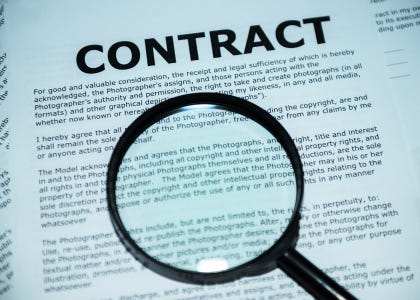
One of the most important transitions in a startup journey is when the founder hands off day-to-day selling.
In the beginning, the founder needs to sell.
If the founder can’t sell the product, no one can!
(HARD TRUTH: If you are not getting good sales results, “hiring a sales person” will not solve this. Do more customer discovery to find the authentic demand and/or work on your own sales skills!)
At some point, the founder-as-the-only-sales-person is not scalable. Deals fall through the cracks. The founder is needed elsewhere. You have too many leads for one person.
It’s time to hire your first sales person!
I have seen this transition with many, many companies, spoken to founders, and picked the brains of successful “first” sales people.
It’s a critical time with a lot on the line.
Here are 5 things to know so you’re set up for success as you take the leap from founder-led sales!
1. Expect A Learning Curve
Your first attempt is probably not going to work out.
I know, I know. I said this blog was about setting you up for success.
Here’s the thing — in order to be successful long term, you need to expect some false starts in the short run.
You will read every blog on scaling sales, talk to mentors, get advice from other founders, interview lots of great sales talent, and 90% of the time, you’ll make a change 30 to 90 days later.
IT’S NOT YOUR FAULT.
There is something nuanced about your business, customer, and sales process that no one knows yet!
You hire a Business Development Rep (BDR) but your customers hate cold calls.
You hire a hungry, scrappy hunter, but you need industry experience.
You hire someone with industry experience, but you need a scrappy hunter.
You hire a full-cycle sales person but your customers want to self-serve.
You hire an SMB sales leader but your product is actually enterprise.
It worked for lots of other companies. But it didn’t work for you.
THE ONLY WAY TO KNOW IS TO TRY.
You test a thoughtful hypothesis and expect the bumps and look for the learnings!
If you’re the founder who makes the right hire for the right process at the right time on the first try?
Buy a lottery ticket, you lucky bastard!
2. Founder is Art; Sales is Science
I’ve heard this from successful first sales reps over and over:
You can’t sell how the founder sells.
The founder is a natural athlete. The first sales person is a student of the game.
Maybe the founder is a sales genius. Maybe they learned to sell along the way.
Regardless, they have the unrepeatable superpower of being The Founder.
They have an intuitive understanding of the customer and problem. They know every nook and cranny of the product. They can tell a heartfelt how-it-came-to-be story.
They probably don’t even know why and how they are good at sales!
The first sales person — the ones who are effective — are avid learners who believe in a sales process.
They soak up the learnings from the founder. Listen to calls, review transcripts, ask about previous deals, shadow whenever they can.
Then turn it into their own sales playbook, often using a framework and process that’s been effective at a previous sales job.
They take the founder’s art and turn it into their science.
3. Your First Rep “Gets” It
A pattern I’ve seen from first sales reps who are successful…
They “get” it.
Your website sucks, the messaging is confusing, your product is barely functional, and this person says, “I totally get it. I see the need. It’s going to be huge. I believe in this.”
Maybe they were a user, from the industry, or they’ve experienced the problem themselves. In some way, they have an inside understanding.
Of course, someone can “get” it and not be successful.
Someone can also have no previous knowledge of the industry and crush it.
(I’ve seen both. See #1 for “Expect A Learning Curve” 😉)
But finding someone with confidence, enthusiasm, and clarity for what you’re building is HUGE.
They bring “Founder Energy” (and customer empathy!) without being the founder.
4. The Founder’s Responsibility
Some of what you’re doing isn’t working.
Yes, you. The founder. Enough stuff is working that overall things are good.
But there’s a slew of wasted time and money.
You just can’t see it.
But the new sales person can.
They will be able to audit the sales process with a fresh perspective.
Are you ready to implement someone else’s suggestions and let go of things that are not working?
Can you let someone else talk to your beloved customers, close your hard-fought deals, and make mistakes along the way?
It’s a tricky balance. You are the expert. Sales are important. A new hire will have a learning curve.
And if they’re f***ing up you need to know quickly.
But no one likes micro management or having reasonable ideas shot down.
Especially not if they’re a really good sales person who is committed to you and the company!
As the founder, make sure you’re ready to loosen the reins, learn how to not be the bottleneck, and for goodness’s sakes, resist the urge to swoop in and shit all over everything.
Avoiding seagull management is key to a smooth sales transition!
5. That Genuine Startup Love
A successful first sales person must want to be at a startup.
Not a make-us-all-billionaires-in-1-year, I-had-a-friend-who-was-at-Facebook startup.
But a real, messy, winding road, no guarantees startup.
Startups mean:
Patience — lots of learning, experiments, and ambiguity along the way
DIY — sourcing your own leads, making your own slide decks, doing your own demos
Financial flexibility — low base salary with high uncapped commissions
Long term upside — HUGE financial and career opportunity
Great journey — with the right team, the startup ride is amazing. Impact, learning, memories.
If someone asks for a super high base salary and needs a sales engineer to be on demos…they are not your person.
In a few years, they may be a good enterprise rep, but today, they will not be able to hang.
A trend I’ve seen across successful first sales reps — they can play the long game and weather the ups and downs, both emotionally and financially!
Of course, part of the deal is that they are rewarded gloriously for their persistence and patience with compensation and career opportunity.
Your best sales rep should make more than anyone else in the company!
After a 1 year vesting period (protecting the company against hiring missteps), they will have a nice stock option grant too.
For their time grinding it out in the trenches and figuring out a successful non-founder selling motion, they have more than earned it!
Transitioning from founder-led sales is a big change but you WILL figure it out!
Think of the thousands (millions??) of successful startups who have come before you who did it.
Always happy to chat about specific scenarios or discuss at Office Hours or Atlanta Tech Week (happening this week)!!!
What other trends or strategies have you seen with a successful handoff from founder to first sales person??
Special thanks to Kasey Hardin, Brett Lange, and Kathryn Farrell for their insights for this post! 🙏🙏🙏


.png)




